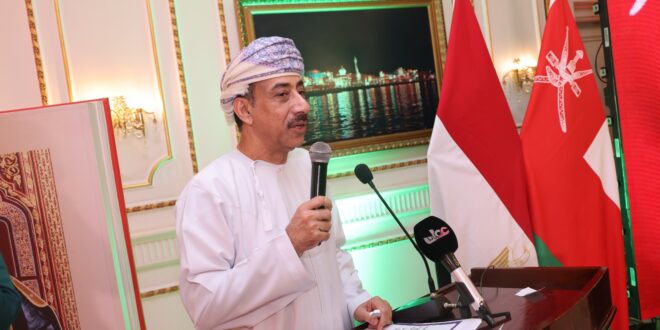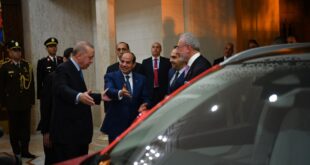Sahar Ragab
Omani Ambassador to Cairo and Permanent Delegate to the Arab League, Abdullah Al-Rahbi, patronized an event and workshop on the tourism sector at the embassy’s premises in Cairo, in collaboration with Oman’s Ministry of Heritage and Tourism.
This initiative aims to strengthen the longstanding relations between Oman and Egypt, embodying Oman Vision 2040’s focus on building strategic partnerships in tourism promotion, encouraging joint investments, and reinforcing economic and cultural ties between the two nations.
In his address, Ambassador Al-Rahbi affirmed that the remarkable growth witnessed in the Omani tourism sector would not have been achieved without the wise directives of the leadership and the pivotal role of the ministry’s leadership in translating those directives, which have prioritized this sector.
He highlighted the tireless efforts of the Ministry of Heritage and Tourism, coupled with the inherent hospitality of the Omani people, who welcome visitors with open arms and genuine warmth.
Within the framework of Oman Vision 2040, he noted, the tourism sector has taken significant strides to become a strategic pillar of the Omani economy.
The promising assets are abundant: from the country’s distinguished geographical location to its captivating natural coastal riches, diverse environments—ranging from mountains and valleys to deserts and beaches—and varied climates shaped by the terrain.
These are complemented by a rich historical and cultural heritage that imparts a unique character to each region, attracting enthusiasts of cultural and heritage tourism.
“This geographical and cultural wealth does not merely constitute tourist destinations,” Al-Rahbi stated.
“Rather, it serves as bridges for rapprochement between peoples. The encounters between tourists from Egypt and the Arab world with the Omani people in heritage sites, valleys, ancient villages, and archaeological locations open horizons for cultural exchange and mutual understanding, while strengthening bonds between Arab nations.
This extends beyond economic dimensions to forge enduring human and cultural connections.”
The ambassador pointed out that in recent years, hundreds of hotel facilities have been established, infrastructure has advanced, and recreational options have multiplied.
In 2024, the Sultanate of Oman attracted over 1.5 million visitors from Gulf countries alone, out of a total of 4 million visitors.
The Sultanate aims to draw 6 million tourists by 2030, with the sector’s contribution to GDP reaching 5% by that year and 10% by 2040, up from its current 2.7%.
According to data from the National Centre for Statistics and Information, the number of visitors reached approximately 4 million by the end of July 2024, including 74,000 Egyptian visitors—not to mention residents in Gulf Cooperation Council countries who are not included in this figure, underscoring the importance of the Egyptian market. Hotel revenues (from 3- to 5-star categories) during the same period amounted to about 132.3 million Omani rials.
Ambassador Abdullah Al-Rahbi emphasized that Omani-Egyptian relations are progressing both quantitatively and qualitatively across numerous fields, with tourism serving as one of the key channels capable of enhancing this convergence—especially given the similarities and complementarities between our two countries, which share a rich historical and cultural legacy, alongside natural assets that draw tourists from around the globe.
He called for bolstering tourism cooperation between Oman and Egypt through: facilitating procedures for investments in this sector and people-to-people visits; exchanging promotional tourism programs and organizing joint trips, particularly for students and all educational institutions from universities to schools, youth, and public and private sector entities; and sharing expertise in marketing, training, and tourism management.
Al-Rahbi commended Egypt’s pioneering experience in tourism, affirming that the Sultanate of Oman is open to all forms of cooperation and partnership with Egypt to bolster this sector, which not only fortifies the economy but also contributes to cultural rapprochement, mutual understanding among peoples, and bridging human relations.
 موقع وجه أفريقيا موقع وجه أفريقيا هو موقع مهتم بمتابعة التطورات في القارة الأفريقية
موقع وجه أفريقيا موقع وجه أفريقيا هو موقع مهتم بمتابعة التطورات في القارة الأفريقية



